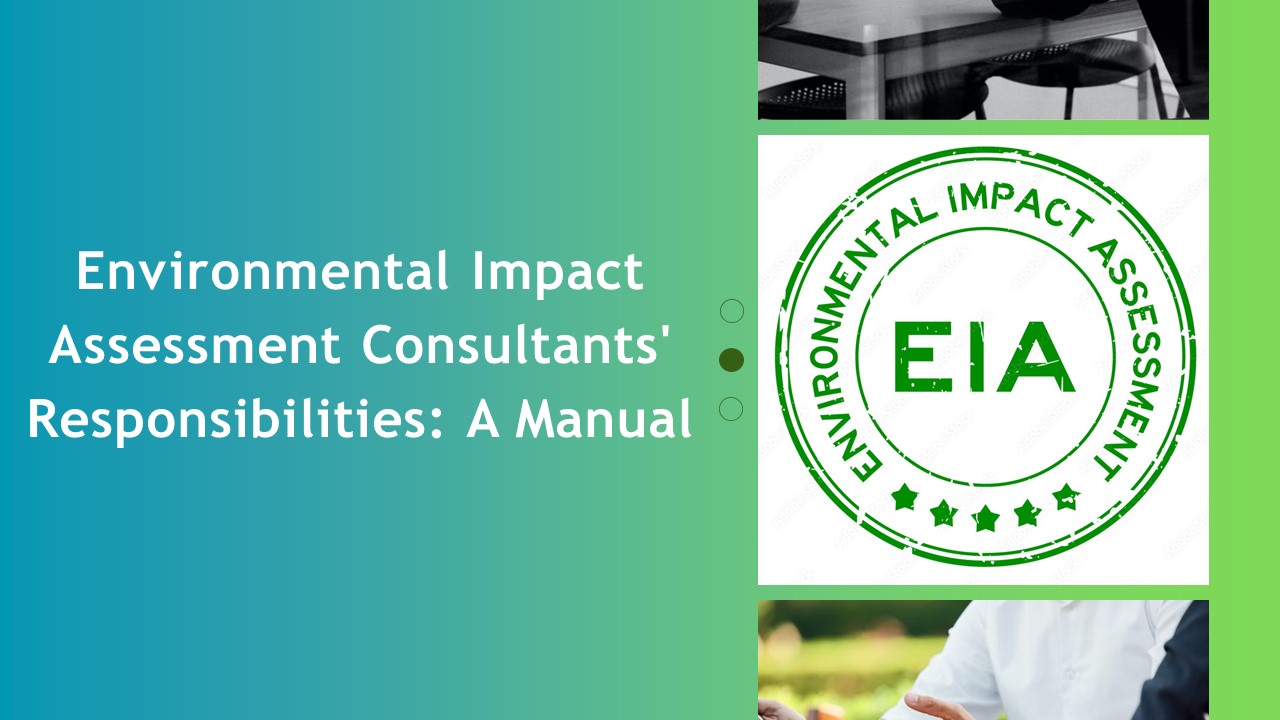Environmental Impact Assessment Consultants' Responsibilities: A Manual - PowerPoint PPT Presentation
Title:
Environmental Impact Assessment Consultants' Responsibilities: A Manual
Description:
Environmental impact assessment (EIA) consultants have an important role to play in assessing and managing the potential environmental implications of development projects, regulations, and programs. Let us explore their roles and responsibilities more carefully here. For more details, log on to the website - #environmentalimpactassessmentconsultant #environmentalservicesdubai #greenbuildingcertification – PowerPoint PPT presentation
Number of Views:8
Title: Environmental Impact Assessment Consultants' Responsibilities: A Manual
1
Environmental Impact Assessment Consultants'
Responsibilities A Manual
2
Environmental impact assessment (EIA) consultants
have an important role to play in assessing and
managing the potential environmental implications
of development projects, regulations, and
programs. In a variety of industries, including
infrastructure construction, mining, energy
production, transportation, and urban planning,
their knowledge is crucial for making ethical
decisions. Let us explore their roles and
responsibilities more carefully.
3
Qualifications and skills Ecology, hydrology,
air quality, and environmental law are among the
environmental sciences that EIA consultants need
to be well-versed in. It is typical to hold a
degree in environmental engineering,
environmental science, or a closely connected
discipline. Technological expertise is required
to apply specific tools and models for impact
assessment, as well as analytical skills to
evaluate complicated data.
4
Good communication is crucial for getting
complicated environmental information across to a
variety of stakeholders, such as project
developers, governmental organizations, and the
general public. EIA consultants oversee numerous
projects at once, which calls for excellent
planning and time-management abilities.
5
Establishing effective connections with
stakeholders calls for tact, empathy, and the
capacity to respond to complaints and criticism
in a constructive manner. By ensuring that
projects take into account and lessen their
environmental implications, EIA experts play a
crucial role in supporting sustainable
development.
6
By collaborating with EIA consultants, project
developers can adhere to environmental standards
like green building certification and lower their
risk of facing legal repercussions and
penalties. Projects with thorough EIAs and
significant environmental obligations typically
have a better image with communities, investors,
and consumers.
7
Early detection of possible environmental
problems enables the implementation of affordable
mitigation strategies, preventing the need for
expensive retrofits or project delays. Including
local groups in the EIA procedure promotes trust
and acceptance of the project, which lowers
resistance and disputes during implementation.
8
Responsibilities
Impact Assessment EIA consultants determine and
forecast any possible project-related
environmental effects. To assess the effects on
biodiversity, ecosystems, human health, and
cultural heritage, they employ a variety of
methodologies and models. Baseline Data
Collection EIA consultants gather baseline data
on the current environmental conditions of the
project region before considering potential
consequences. This entails researching the area's
ecology, acoustics, water resources, air quality,
and socioeconomic variables.
9
Mitigation strategies Consultants provide
mitigation strategies to lessen or eliminate
negative consequences after examining the
effects. These tactics seek to increase project
sustainability while reducing negative
environmental and local community
effects. Public Consultations Environment
Services in Dubai lead public discussions to
elicit feedback from regional communities,
non-profit organizations, and other stakeholders.
The decision-making process benefits from
transparency and inclusivity thanks to this
interactive method.
10
Compliance and regulatory assistance EIA experts
ensure that the project complies with all
applicable environmental laws, regulations, and
permits. Additionally, they aid in getting the
required government approvals. Review and
scoping of the project Consultants for the EIA
evaluate proposed projects to identify any
potential environmental implications. They
collaborate closely with stakeholders and project
developers to determine the scope of the
assessment, including the most important problems
that need to be solved.
11
By evaluating potential environmental impacts and
recommending practical mitigation solutions,
Environmental Impact Assessment(EIA) Consultant
play a crucial role in promoting responsible and
sustainable development. They ensure that
economic progress is balanced with ecological
conservation and societal well-being thanks to
their expertise, which benefits project
developers as well as the environment.
Decision-makers can make wise decisions that
promote a greener and more sustainable future by
following their recommendations.
12
THANKS































